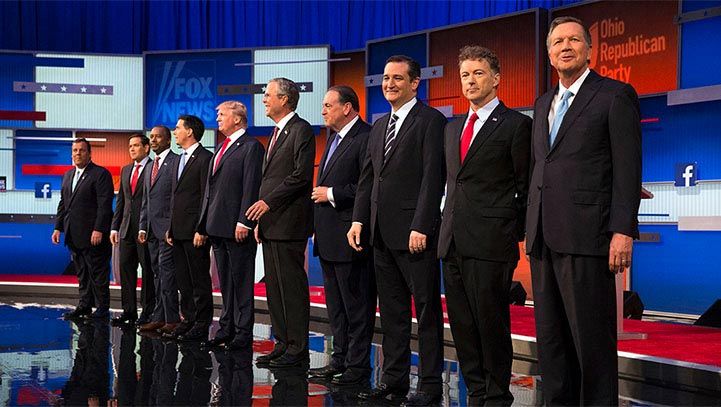
Far too often, Americans simply vote for their favorite party’s presidential candidate or the person who appears to have won all of the final televised debates. While this may seem like a reliable way to vote, it can still fail us since no one candidate ever has all of the best answers. Furthermore, party platforms often have several political “landmines” buried within them – so it’s important to know if programs you consider critical for this country are already on the “chopping block.” It’s also wise to take highly successful third-party candidates seriously since a day may soon appear when one of them will be so well-financed that he or she may actually manage to win or “buy” an election.
If you’re determined to vote responsibly, consider spending at least an hour (or more) of your time carefully reading through your favorite candidate’s party platform (and/or published personal stands on all critical issues) well before ever entering a voting booth. When we each simply vote “our feelings,” we can easily fail to properly evaluate each candidate, thereby crippling our democracy’s future. It’s also wise to check out your favorite candidate’s major opponent – so you’ll know what to expect if your vote fails to be a winning one – and various compromises might be necessary in the future.
Here are a number of useful links and resources for learning more about the current candidates running for U. S. President in 2016. Of course, this list will soon diminish as primaries start coming and going. It will also shrink as candidates lacking any mature impulse control wind up destroying their own chances of being elected. ( Since this list is not intended to be comprehensive, you should still plan on doing additional research on your own ).
Key internet resources for 2016 presidential candidates
- The Republican Party Platform
- The Democratic Party Platform
- Hillary Clinton’s s tands on the issues
- Donald Trump’s p olitical s tance
- Jeb Bush’s opinions
- Bernie Sander’s views on all major issues
- Ben Carson’s political stance
- Chris Christie’s views regarding America’s most critical problems
- Jeb Bush’s stance
- Rick Santorum’s beliefs regarding America’s best future
- Carly Fiorina’s 2016 platform
- Ted Cruz’s answers for America’s most difficult issues
- (You can learn more about all other candidates by using Google or another search engine)
Key issues that define candidates
- The economy. This will surely remain critical to every presidential election, especially now that many voters’ incomes are so far apart. Always look for clear-cut suggestions regarding our tax system, the minimum wage, proper handling of the deficit, and other related issues;
- Education. We have already reached a point where the poor and disappearing middle classes cannot obtain a good college education due to an absurd increase in tuition and other fees. Find out what suggestions your candidate is making? Are they likely to be turned into legislation?
- Immigration. What types of creative solutions – plural – is your favorite candidate offering? Is this person suggesting more than just building big walls or deporting vast numbers of people already here? Is s/he claiming we can instantly reverse any Constitutional amendments? If so, be sure to read up on what happened to the proposed – and failed E. R. A. A mendment ;
- Social issues. Can your candidate really think both abstractly and concretely about such topics as Medicare and Social Security? Does s/he have any strong ideas for diminishing the rampant racism that’s still so popular in this country – even if it’s usually hidden publicly? How does your candidate view women’s rights, the current Planned Parenthood debate, abortion, and fully paid pregnancy leave options? Even if these topics seem unimportant to you, the generations now approaching voting age will definitely be confronting them soon;
- Foreign policy. Does your candidate have any meaningful experience in this realm? If you’ll review what’s happened during the last four or five presidential administrations, you’ll probably notice that the lack of first-hand experience in this arena can prove disastrous for American interests. When a candidate hasn’t served in the U. S. Congress – or in any elected office – s/he is almost always going to make serious errors. A huge ego is never a good substitute for experience in foreign policy. Furthermore, we need strong leadership as we decide how best to interact with groups like ISIS and others that are sure to develop in the future;
- Equality. Does your candidate truly see himself/herself as one among equals in terms of America’s basic democratic principles? Does s/he even believe that all people are born with innate equal value – and deserve equal rights? Now that money alone can make you eligible to run for president in America, are we going to allow thinly disguised (and delusional) elitism to weaken our government? Politicians who clearly view themselves as superior to the masses are almost never able to provide meaningful leadership in office.
Additional links and resources for 2016 Voters
- The Presidential Primary ;
- America’s electoral college
- Learning from our past elected presidents (government link); History.com
- The Library of Congress website;
- Ben’s Guide. This provides a great way to explain the election process and how our government is supposed to work to all young children;
- Six more great links to help you track the 2016 election as it unfolds,
Should the 2016 presidential election prove highly exceptional, we may even elect a candidate confident and capable enough to honor the Golden Rule while in office: “Do unto others as you would have them do unto you.”
Elizabeth Smith, J.D., M.A. is a freelance writer and graduate of both the University of Texas Law School and Fuller Seminary
Featured image courtesy of Politico






